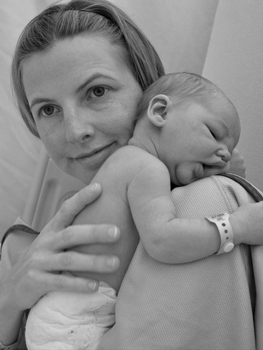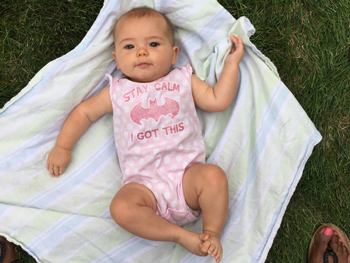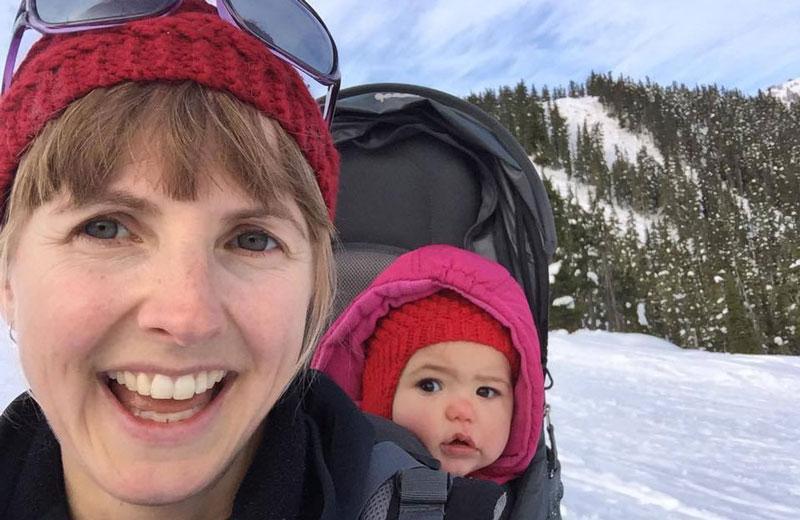“It felt like one long panic attack.”
That’s how Tania Harling of Terrace, a mother of two teenage girls, describes the weeks just after she gave birth to her first daughter in 2007.
“The first 24 hours after giving birth, I was thinking, ‘This is going to be the most amazing thing I’ve ever done in my life,’” Tania said. “But upon leaving the hospital, I just felt so out of it. Everything was suddenly so different.”
Over the next couple weeks, Tania lost about 30 lbs.
“I couldn’t eat. I just felt sick. I felt so alone. Hearing the baby cry and knowing I was the only one who was actually going to deal with that,” she said. “I think I was just so tired and looking back on it, I see this is how I often feel when I don’t sleep. All the rational feelings become irrational.”
As noted on BC Women’s Hospital and Health Centre website, “one out of every six women, and one out of every 10 men experience sadness, depression, or anxiety after the birth or adoption of a child.”
That’s a staggering statistic.
It can happen to anyone

On the surface, Tania’s situation seemed ideal.
“Going into it, I wasn’t anxious about anything. Everything was planned,” she said.
She had a partner, a home, and a great relationship with her doctor. Her pregnancy and labour were smooth, and the birth went well. Her newborn was even an “easy baby.” She slept well and didn’t cry very much.
“It wasn’t anything I did,” Tania said. “But being in charge of something so delicate and precious … it’s bound to bring up some fears and paranoia that many haven’t experienced.”
This too shall pass
Soon after Tania came home, a public health nurse came to visit her and her new infant. The nurse knew immediately that Tania needed support and made sure she went to see her doctor. Tania’s doctor diagnosed her with perinatal anxiety and put her on medication. He also connected her with a mental health clinician.
A combination of strategies and supports helped Tania get through this experience and within three weeks of giving birth, she felt fine.
“After regaining some sleep and some normalcy in life, I was able to feel calm and see that things were doable. It also helped to just get into a routine and prove I could do it,” she said. “When you’re a new mom, you feel like how it is on the first day is how it will be forever. You don’t realize how schedules and patterns – all the things – will change.”
It’s okay to not be okay
Luckily, Tania didn’t experience the same crippling feelings after giving birth to her second daughter. But the experience sticks with her. She said there’s so much she could say if she were talking to new parents who may be having similar experiences.

“Realize that even just small things can make a big difference. For example, dehydration can lead to anxiety,” said Tania.
For those who are supporting new parents, Tania said, “Don’t think ‘Oh, you had a baby. Everything must be wonderful!’ Maybe take a different approach when asking them how they’re doing. Maybe expect them to not be okay.”
Give help and get help
“It’s so important for support people to check in often with new parents and offer help,” said Randi Leanne Parsons, Northern Health’s Regional Nursing Lead for Maternal Infant Health. “Many families struggle with perinatal mental health.”
“It’s equally important for new parents to reach out to friends, family, neighbours, peers, and care providers – even when it’s hard to ask for help,” she added. “It takes a village, and we all need a circle of support wrapped around us.”
Support is available
If you’re feeling overwhelmed or have concerns about your mental health during pregnancy, after the birth or adoption of a baby, and up to one year postpartum, you’re not alone. These feelings are more common than many people realize, and support is available. It’s also important to note that in some cases, families struggling with perinatal mental health issues may also be struggling with substance use.
Explore the resources below as you feel ready:
- Anxiety disorders during pregnancy and postpartum (video) - BC Women's Hospital + Health Centre
- Depression during pregnancy and postpartum (video) - BC Women's Hospital + Health Centre
- Pacific post partum support society for peer support, call toll-free: 1-855-255-7999 or text: 604-255-7999
- Call your local health unit or medical clinic to connect with primary and community care interprofessional teams for screening and support with perinatal mental health and substance use. Referrals for specialized care is available as needed.
Need help right away?
If you’re in a crisis or emergency, or are worried that you or a loved one is at risk of harm:
- Call 9-1-1 or go to the nearest emergency room if you are afraid of hurting yourself or someone else, or if no other options are available.
- Call 1-800-SUICIDE (1-800-784-2433) if you or someone you know is having thoughts of suicide.
- Call 310 Mental Health Support: 310-6789 (no area code needed) to speak to a crisis line worker 24/7.














Comments